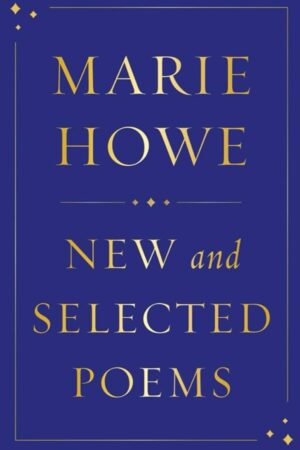New and Selected Poems
by Marie Howe
reviewed by Kevin O'Connor
If poets live long enough, their later lyrics might come full circle, delivering on some of the richest veins of their early promise. In New and Selected Poems Marie Howe offers poems both elegantly high-minded and unnervingly explicit and direct. Howe’s evolving style in her fifth collection reflects a willingness to question at each new beginning what poetry can be—to ask fundamental existential questions and to take seriously the essential mysteries posed by religion, especially the Catholicism of her upbringing. Sometimes inspired by myths and stories from the Bible—especially female protagonists like Persephone, Eve, the Virgin Mary, and Mary Magdalene—Howe goes beyond finding divinity in the human: in the erasures and silences of received wisdom literature, she reimagines a female experience of the sacred.
Howe’s first two books map her imaginative field between registers of the grandly mythic and the specifically personal. “Death, The Last Visit” from The Good Thief (1987) explores the merging of sexual and eschatological hungers: “Locking its arm around you, it will hold you as long as you ever wanted.” Inspired by the language of nature in “The Meadow,” the speaker echoes a plaintive Rainer Maria Rilke in searching for “the sentence that could change your life.”
In her subsequent, more intimate collection What the Living Do (1997) Howe finds a plain, stripped-down language that perfectly suits both its rites-of-female-passage poems as well as the tender elegies for her brother John, who died of AIDS. “Practicing” captures a crisis stage of preadolescent girls who experiment sexually before transitioning to heteronormativity. Both subjects coalesce poignantly in “The Attic,” where her brother’s gentle caring salves wounds from her own abuse:
I don’t know if he knows he’s building a world where I can one day
love a man—he sits there without saying anything.
Praise him.
I know he can hardly bear to touch me.
At her best in The Kingdom of Ordinary Time (2008), Howe locates the religious in the creaturely; she tests herself in “Star Market” against Jesus’s command to love the “feeble, the lame,” like the “lead-colored man” smelling of decay and “hawking into his hand.” While “Poems from The Life of Mary” yield some delicate epiphanies, she finds a more fruitful New Testament persona in the eponymously titled Magdalene (2017), where she can complicate and subvert the conventional female archetypes of virgin mother and repentant prostitute. Whether she is fleshing out a Biblical reference to exorcism in “Magdalene—The Seven Devils” or raucously recounting a catalogue of penis types in “On Men, Their Bodies,” Howe conjures feminist parables, intimating the moral and spiritual through the graphic.
In Howe’s New Poems (2023) readers might hear the seasoned poet rewinding her own youthful songs. The title of “Practicing” from What the Living Do about sexual fluidity is radically repurposed: “Today I’m going to practice being dead for a few hours.” The piquancy of mortality-tinged sexuality in “Death, the Last Visit,” has become the full-on eroticized death wish of “Persephone and Demeter”:
Like everything alive. I was meant to be split open,
to blossom, to be sucked, to be eaten,
to lean, to bend, to wither,
to die and die and die until I died.
Her style of spare, discretely spaced single lines in these new poems reflects an increasing austerity, as if any predetermined form would inhibit the stark, truth-telling authenticity of each succeeding line. Howe looks to cutting-edge astrophysics rather than religious myth in “The Singularity” to imagine an expanse of time that dwarfs human life spans. Similarly, in the rhythmic rush of one long sentence, “Hymn” offers a rhapsody extending from prehuman timelessness to the Anthropocene and beyond:
a hymn growing louder, for the moon and the sun,
……………………….a song without words for the snow falling,
…………………………………………for snow conceiving snow
.conceiving rain, the rivers rushing without shame,
………………………..the hum turning again higher—into a riff of ridges
…………………………………………peaks hard as consonants
Suggesting the full tonal range of this collection, “Postscript” serves up an outraged catalogue of human desecrations: “What we did to the cow, to the pig, to the lamb, / We did to the earth, butchered and milked it.” An intermittent keynote throughout is a mordant, self-deprecating wit apparent from the opening “Prologue”:
In the middle of my life—just past the middle—
walking along the street with our little dog Jack on a leash
–Ok—just past the late middle—
in what some might call early old age
Howe’s allusion to Dante’s Divine Comedy here sounds like the beginning of a sobering stand-up act. Never prone to over-publishing, in New and Selected Poems Marie Howe offers an even more carefully culled and shaped version of her most distinctive work.
Published on January 6, 2025

